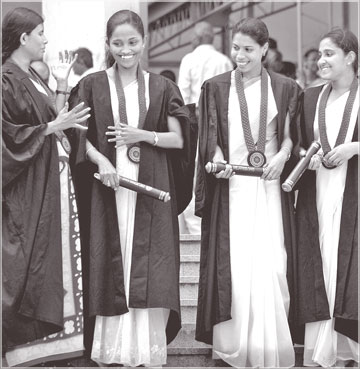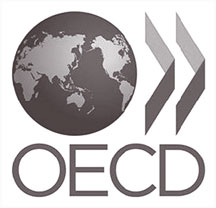Sri Lanka - cyber savvy economics
Lionel Wijesiri
Knowledge economy is one of most debated topics today, particularly
its potential of defining future global economic powerhouses. In 1996,
Organization for Economic Cooperation and Development (OECD) defined
Knowledge-Based Economy (KBE) as being “directly based on the
production, distribution and use of knowledge and information”, it was
readily adopted and later expanded to also cover the “production,
distribution, and use of knowledge is the main driver of growth, wealth
creation and employment across all industries”.
|

Employment-oriented higher education system needed |
There are two forces that are playing a key role in defining the
knowledge economy, namely the intense need of knowledge in enhancing
economic activities and the increasing globalization of economic
affairs. The intense need of knowledge is driven by the combined forces
of information technology revolution and the increased pace of
technological change.
Globalization, on the other hand, is driven by national and
international deregulation and assisted by IT-related communication
revolution.
But it is not just education; it is also about systems, processes,
regulations, discipline, trade, innovation, information technology, etc.
Knowledge Economic Index
To evaluate a country’s status in this new knowledge economy, the
World Bank has created a tool that it calls Knowledge Assessment
Methodology (KAM) from which a Knowledge Economic Index (KEI) is
created.
Higher the KEI, higher is the per capita income of that country and
vice versa.
According to 2012 statistics, highest KEI is reported from Sweden at
9.43 on a scale of 1 to 10, and the lowest KEI is of Myanmar at 0.96 at
rank 145, Pakistan is ranked 117th with a KEI score of 2.45, with India
at 110th position and KEI of 3.06 and Sri Lanka at 87th place and has
KEI of 3.63. Sri Lanka is well ahead of India and Pakistan.
The four pillars
The World Bank Institute has defined the knowledge economy as
consisting of four pillars, which if strengthened, can result in growth
and development.
1. The business environment: An economic and institutional regime
that provides incentives for the efficient creation, dissemination, and
use of existing knowledge. For example, tariff and non-tariff barriers,
regulatory quality, and the rule of law.

2. Dynamic information infrastructure: Institutional set-up which can
facilitate the effective communication, dissemination, and processing of
information. (telephones per 1,000 persons, computer per 1,000 persons,
and Internet users per 10,000 persons)
3. Human resources: An educated and skilled population that can
create and use knowledge. (adult literacy rate (percent age 15 and
above), secondary enrolment, and tertiary enrolment)
4. Efficient innovation system: This includes of firms, research
centres, universities, consultants, and other organizations that can tap
into the growing stock of global knowledge and assimilate and adapt it
to local needs, as well as to create relevant new knowledge. (R and D,
patent applications, and scientific and technical journal articles)
Some modern also add culture as another 'pillar'. The culture of a
country, which is not replicable and transferable, is the competitive
factor that makes a knowledge economy unique.
Contemporary history reveals that some developing countries have
failed to be developed as knowledge economies even as much investment is
made towards developing other recommended areas.
What this means is that more attention has to be paid to the needs
and expectations of the workers in the knowledge-based economies, such
as in the provision of arts and cultural attractions, and other aspects
that help improve overall quality of life.
Demand for education
As a fast-developing economy, Sri Lanka too, in the recent past, has
begun to make the inevitable approach towards creating a knowledge
economy.
We can witness a revolution that is characterized by the
transformation of various aspects of our society which do not only
include technology changes, but one that involves institutional and
cultural impact as well.
The government has already taken steps to raise the standards of the
six universities in Sri Lanka to international level. The Ministry of
Higher Education has invited foreign universities to establish campuses
to provide diversified higher education programmes. Ministry information
revealed that 10 branch campuses of 10 international universities are
expected to be established in Sri Lanka within the next year.
According to the Chairman –University Grants Commission, Prof. Gamini
Samaranayake, the biggest challenge facing our university education is
ensuring equal opportunity in access and equity in the quality of
education. Quoting statistics, he adds, “Annually, well over 250,000
students sit for the Advanced Level Examination and half of them are
qualified for university education.
However, only 22,000 are able to enter university education in the
country.
Of them, 9,000 enroll in vocational training through 12 Advanced
Technological Institutes, 20,000 enroll at the Open University, 8,000,
access overseas education, and 20,000 register as external candidates
while 9,000 are studying for a foreign degree via cross border
institutes. Nearly, 60,000 students are looking for alternative higher
education locally”.
He further adds that the ever increasing demand for higher education
in the country is an impetus for growth and advancement.
It is therefore abundantly clear that the creation and measurement of
a knowledge economy moves beyond the realm of human capital and includes
what is known as structural and relational capital.
National Knowledge Commission
Having maintained steady economic growth over the years, the
government has clearly understood that it is time to make Sri Lanka a
knowledge economy. It is not a pipe dream but a reality, both actionable
and achievable.
It is in this context the writer feels we can learn a lesson from
India and take the first step in this direction by establishing an
Indian model of a ‘National Knowledge Commission’. In June 2005, Prime
Minister of India, Dr. Manmohan Singh, constituted National Knowledge
Commission (NKC) which was a high-level advisory body to him, with the
objective of transforming India into a knowledge economy. In its
endeavour to transform the knowledge landscape of the country, the
National Knowledge Commission has submitted around 300 recommendations
on 27 focus areas during its three and a half year term.
The Terms of Reference of the NKC were:
(1) Build excellence in the educational system to meet the knowledge
challenges of the 21st century and increase India’s competitive
advantage in fields of knowledge.
(2) Promote creation of knowledge in Science and technology
laboratories.
(3) Improve the management of institutions engaged in Intellectual
Property Rights.
(4) Promote knowledge applications in Agriculture and Industry.
(5) Promote the use of knowledge capabilities in making government an
effective, transparent and accountable service provider to the citizen
and promote widespread sharing of knowledge to maximize public benefit.
The organizational structure of the NKC was flat. The Secretariat was
headed by an Executive Director and consisted of nine research
associates. It also had four advisors who advised the commission on
different issues.
Many of the recommendations of the NKC have already been implemented
by different ministries of the Indian government. Some of the major
developed areas were higher education, vocational education,
entrepreneurship, school education. The NKC consulted a wide range of
stakeholders and experts on each area before submitting the
recommendations to the Prime Minister. Each area had a working group
which was headed by a prominent person in that field. After submitting
the recommendations, an extensive coordination also takes place with the
Planning Commission of India and relevant ministries of the government.
Priorities
Creation of knowledge economy principally depends on strengthening
the education system, promoting domestic research and innovation in
laboratories as well as at the grass roots level, and tapping foreign
sources of knowledge through more open trading regimes, foreign
investment and technology licensing.
Application of knowledge should primarily target the sectors of
health, agriculture, government and industry.
This involves diverse priorities like using traditional knowledge in
agriculture, encouraging innovation in industry and agriculture, and
building a strong e-governance framework for public services;
dissemination of knowledge focuses on ensuring universal elementary
education, especially for traditionally disadvantaged groups, creating a
culture of lifelong learning especially for skilled workers, taking
steps to boost literacy levels; and using Information and Communication
Technology (ICT) to enhance standards in education and widely
disseminate easily accessible knowledge that is useful to the public.
All these activities are essential.
The task ahead is at many levels - from primary schools to higher
education and research institutions of national excellence. At all
levels, there is a need to improve both access and excellence. There
are, of course, fiscal and administrative challenges to be tackled and
there are intellectual and leadership issues to be addressed. We must
address them boldly.
A properly instituted Knowledge Commission can come forward with
creative ideas to promote the know1edge base of our economy and to
exploit the vast latent potential that lies. We must leverage it to make
Sri Lanka truly the Knowledge Engine of Asia. |







